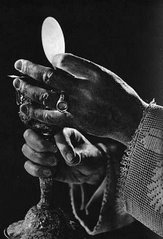The second letter starts off with the news that Wormwood’s patient has become a Christian. This may be surprising to some as it would seem that Lewis would devote a whole series of letters into deceiving the patient away from Christianity with a conversion as the final defeat of the Lowerarchy. Instead, Lewis devotes only a single letter to the patient’s pre-Christian days. This might have to do with Lewis’s declaration , despite his being a long-time atheist, that atheism was merely “a boy’s philosophy.” But I think that more importantly this decision is influenced by Lewis’s belief that conversion is a life-long process and we are constantly struggling against sin in order to accept Christ. So Lewis chooses to focus on the period right after conversion when the patient is still discovering his faith and when perhaps the truth can most be perverted by Screwtape.
And as Screwtape points out, the period after conversion is a particularly vulnerable stage:
“At bottom, he still believes he has run up a favorable credit-balance in the Enemy’s ledger by allowing himself to be converted…”
That is, the newly converted have a natural vulnerability to self-righteousness. This inflation of pride in the patient coupled with the patient’s inexperience with the Christian community, namely the Church, can be put to the advantage of Screwtape. This is not the “Church as we see her spread out through all time and space and rooted in eternity, terrible as an army with banners,” but the physical church as seen by the new Christian which would be “the half-finished, sham Gothic erection on the new building estate.” So Screwtape is attacking here the difference between the idealistic conception of the Church and Christians and the realities. This might be the trivial and silly, that is the difference between the mental images of Christians as wearing togas and sandals as they did in the time of Christ being martyred and the silly woman whose hat is funny-looking and can’t sing on key to the more serious, such as seeing well-known sinners in Church.
Scott Hahn had a similar problem when he was considering entering the Church. He fell in love with the theology of Ratzinger and John Paul II and particularly with Eucharistic theology. He loved the Scriptural basis of the liturgy. However, upon talking with various priests he wasn’t sure, as his wife put it, “that the Catholic Church he believed in still existed” (Rome Sweet Home). That seems to be a mighty trick of the devil. He separates us from the Church by getting us to focus too much on the flawed physical Church and not enough on the invisible Church which Screwtape admits “is a spectacle that makes our boldest tempters uneasy.” Whether it’s the child in the pew in front of us that’s cutting up during the homily or the silliness of some of the congregation, if we become too focused on the physical we miss what’s most important.
Having seen the physical fail to match up to the ideal, a natural period of disappointment follows. This, Screwtape believes, is a key moment in the battle of the soul for both God and Wormwood.
“The Enemy allows this disappointment to occur on the threshold of every human endeavor. It occurs when the boy who had been enchanted in the nursery by Stories from the Odyssey buckles down to really learning Greek. It occurs when lovers have got married and begin the real task of learning to live together. In every department of life it marks the transition from dreaming aspiration to laborious doing. The Enemy takes this risk because He has a curious fantasy of making all these disgusting little human vermin into what He calls His ‘free’ lovers and servants-‘sons’ is the word He uses, with His inveterate love of degrading the whole spiritual world by unnatural liaisons with the two-legged animals…If once they get through this initial dryness successfully, they become much less dependent on emotion and therefore much harder to tempt.”
When in faith and in love and in life we confront the inevitable shortfalls of this imperfect world, the choice is set upon us very clearly. We either declare the shortfall to be indicative of our inability to sustain happiness or we declare the shortfall to be indicative of our inability to sustain happiness outside of the perfect God. If we make the latter choice we will be far stronger than we would if we had not been disappointed. Perhaps this is a partial explanation of why we suffer: it is to teach us this lesson and to demand the difficult choice of us so that we grow more aware of our reliance on God for happiness.
Subscribe to:
Post Comments (Atom)






1 comment:
It IS interesting, isn't it, considering Lewis's own drawn out conversion of breaking through one barrier after another (intellectually) in the move from Atheism to Christ. Maybe Screwtape and Wormwood didn't have so much to do with (or say about) the patient before he "passed from death into life" - that is - while he was still in their clutches. But once he became a Christian - presumably, an Anglican ;) - they become a bit more concerned, lest they completely lose him to "the Enemy" after all...
Post a Comment